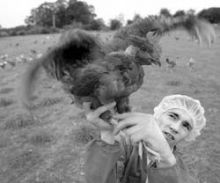More than 50,000 chickens and geese have been seized and destroyed in the quarantine zone during the two weeks of combating bird flu in the Crimea.
According to the Public Relations Center of the Crimean Main Directorate for Emergencies, all birds were seized in seven populated areas in the Crimea, and in some of the 12 villages where highly pathogenic avian influenza has been detected domestic fowl is being destroyed in nearly every courtyard. The villagers affected by the bird flu epidemic have already received more than 1.2 million hryvnias in damages. Veterinary, public-hygiene, and epidemiological teams have vaccinated over 30,000 people, including almost 5,000 children. No infected people were found, but hospitals have been alerted in case an epidemic breaks out, the press service of the Ministry for Emergencies reports.
There still is a danger of bird flu spreading to other territories. According to the press service of the Ministry of Public Health, bird flu in the Crimea continues. New cases have been recorded in the past few days in the villages of Maryino, Khmeleve, Chornomorsky District, and in Chornomorske itself. The ministry reports that 12,500 people remain under observation in Chornomorske, 76 in Maryino, and 241 in Khmeleve. Mass deaths of fowl have been detected in 25 Crimean cities and villages. Laboratory tests have confirmed that the bird deaths in 12 of them were caused by the H5N1 avian influenza virus.
Interfax-Ukraine reports that the UN has offered Ukraine humanitarian aid to successfully combat avian influenza. Vitaliy Maryniuk, chief of the Department of Medico-Biological Protection and Medical Disasters at the Ministry for Emergencies of Ukraine, told journalists that although Ukraine is perfectly capable of bringing the situation under control, it will not turn down international aid. Maryniuk says that the ministry has received a letter from the UN Mission with an offer of help. A list was drawn up of required equipment and chemicals, including those for disinfection. The list was forwarded to the UN via the Cabinet of Ministers of Ukraine. According to Serhiy Melnychuk, chief of the Ukrainian Laboratory of Agricultural Produce Quality and Safety at National Agrarian University, the threat of bird flu virus proliferation will increase again in the springtime, when great numbers of migratory birds cross Ukraine from wintering places to their habitats.
In a letter to the chairpersons of raion councils and rural, town, and municipal heads, Crimean Supreme Council Chairman Borys Deich urged local officials to redouble their efforts to check and eliminate hotbeds of bird flu in the Crimea’s populated areas. “In view of the current emergency, it is absolutely crucial for residents to assist Operational Headquarters and other organizations that are addressing this range of problems,” the letter emphasizes. Deich also asks formations tasked to uphold civil order and neighborhood watch units to prevent domestic fowl from wandering about unattended on Crimean territory.
Prime Minister Yuriy Yekhanurov has not ruled out lifting the state of emergency in the Crimea next week. “I would like for us to ring in the New Year without a state of emergency in Ukraine,” the cabinet’s press service quotes the prime minister as saying. Yekhanurov has issued instructions to explore the legal possibility of lifting the state of emergency, stressing that the government does not oppose this. “I think that a quarantine is perfectly adequate,” the head of the Ukrainian government noted. He also pointed out that the final decision on this matter should be made by Vice-Prime Minister Yuriy Melnyk, Emergencies Minister Viktor Baloha, and Agrarian Policies Minister Oleksandr Baranivsky after Ukraine receives documents from the Regional Commission (Europe) of the World Organization for Animal Health, which is now processing the data on bird flu in Ukraine.
Simferopol has drawn up a list of additional measures to prevent the highly pathogenic bird flu from entering and spreading throughout the city. The State Veterinary Medical Department has been instructed to make sure that individual farmers strictly observe the ban on the free movement of domestic fowl. Law-enforcement bodies and the management of the Salgir Irrigation System were told to ensure round-the- clock protection of coastal areas that are dotted with natural and artificial water reservoirs to suspend fishing and monitor the condition of wild and synanthropic bird species. The municipal council’s financial department is to allot funds for vaccinating at-risk personnel.
So far bird flu has not diminished the popularity of Crimean resorts in unaffected areas. According to Yevpatoriya Mayor Andriy Danylenko, the appearance of the bird flu virus in the Crimea has not stemmed the tide of tourists flocking into the city’s holiday centers. He told a Council of Ministers meeting that the city’s 30 year-round holiday centers have a 60-percent occupancy rate. “The imposition of a state of emergency has not affected, and I think will not affect, the influx of tourists,” he noted. The city’s holiday centers are still receiving bookings for Christmas vacations, and some of them are even more heavily booked than last year.







